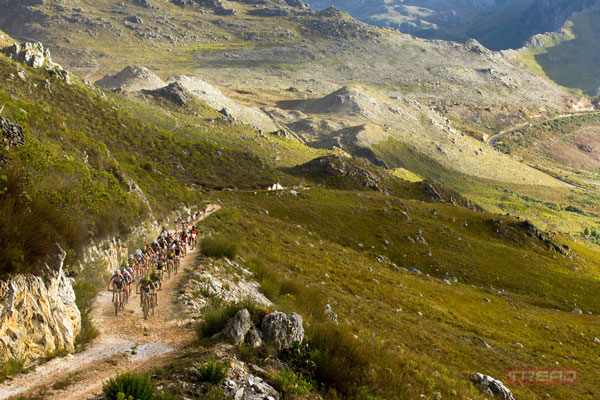It’s a question many ask – must I do a Cape Epic? Am I only considered a real mountain biker once I’ve completed a Cape Epic? Well, having ridden two and covered a few more as a media guy, here’s my take…
By Sean Badenhorst
To be honest, while it’s an absolute world-class event with high standards and slick organisation, the Cape Epic is mainly a test of endurance and recovery. Anyone can train enough to finish a Cape Epic, you just need the time, or let me rephrase that: you just need to MAKE the time. It requires about six months of physical and mental preparation, although if you are already pretty conditioned, you could finish it with six weeks of focus.
The cost is quite a challenge for most South African mountain bikers, especially at this time of economic gloom. It’s currently R30 000 per team member and the associated costs add up too. You don’t need a new bike if you already have a reliable dual-suspension 29er, but you will need to do a few preparation races that mimic the Cape Epic, ideally in January and February.
The popular preparation races are the Fairview Attakwas in Oudtshoorn in mid-January, the opening round of the Ashburton Investments National Marathon Series on the last weekend of January, lately at Meerendal, Durbanville and of course the Sabie Classic, which is the third weekend of February.
The three short stage races that most do for Cape Epic preparation are the Garden Route 300 in Knysna (end of February), the DUTOIT Tankwa Trek in the Cederberg (mid February) and the Bridgestone Route 66 in Gauteng (also mid February). They’re three-day races that offer above average difficulty and good Cape Epic preparation.
For the Cape Epic itself, assuming you use the tent option during the race, you will need to get to Cape Town and back to where ever you live, have accommodation for at least the night before and have transport to and from the airport (if you are flying).
Don’t forget your nutrition supplements, spares and clothing for the race and possibly some maintenance/repair charges during the race. With the entry fee, you’re probably in for at least R70 000.
Factor in a couple of weeks leave before the end of March to fit all of the above in (don’t forget to include travel days), so increased pressure is likely on the work front. And, for those with a family, the home front too…

Photo: Gary Perkin/Cape Epic/SPORTZPICS
BUT…
The Western Cape is probably the most scenic South African province in which to ride a mountain bike. It’s just beautiful. If you’re not too shattered, you will appreciate this. And to ride your mountain bike every day there for eight days is pretty damn special. Some parts of the race roll through land that’s not normally open for mountain biking, making it a fairly rare concession.
Very few stage races can match the Cape Epic in terms of rider experience off the bike too. Wet face cloths, mist-spray zone, Woolworths food and drinks, ice baths, bean bags, chill zone are all part of your entry fee and of the highest standard.
The family picnic package at the finish and the bottle of champagne is also a really cool thing. The water points on the route are more than just water points – there’s a wide range of appropriate eats and drinks, which seem to always be well stocked as well as chain lube stations and eyewear cleaning points.
The race bag from Evoc, the finisher’s t-shirt and medal – these are all high quality and worthy keepsakes.
The other thing we really like is that you get cloth numbers to fasten to the back of your racing jersey (first mountain bike race we’ve experienced this). This is in addition to your handlebar mounted race number. The cloth numbers also include your first name, how many Cape Epic’s you’ve completed, your racing category and your home nation flag. You can quickly strike up a conversation with anyone in the race based on the information you can see on his/her lower back. Really cool!
SO…
Finishing the Cape Epic isn’t that difficult if you are well conditioned and reasonably skilled. The more skilled you are of course, the more you relax when you should relax, like on downhills and on uncomplicated singletrack and on gravel roads. All of that makes up quite a lot of the route, so by not relaxing at those times, you will expend unnecessary energy through stress and tension.
Truth be told, while the general level of endurance at the Cape Epic is quite high the general level of skill is rather low.
A well-rounded mountain biker has a good combination of power, endurance and skill. Make no mistake; it’s a wonderful feeling to finish a Cape Epic. But it doesn’t determine whether you are a true mountain biker or not…
TREAD Magazine is sold throughout South Africa and can be found in: Spar, CNA, Exclusive Books, Discerning bike shops and on Zinio
*Originally published in TREAD Issue 39, 2016 – All rights reserved



